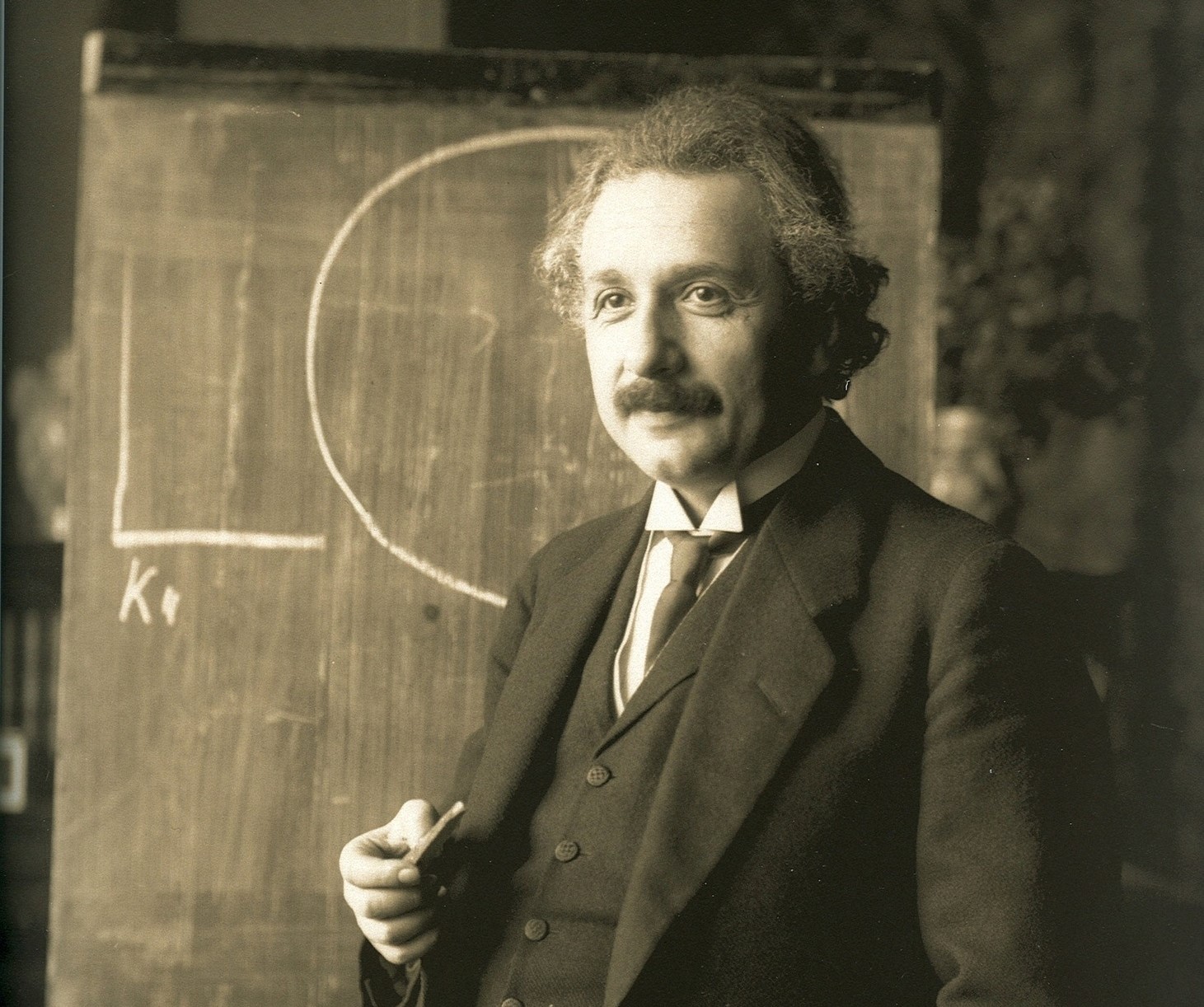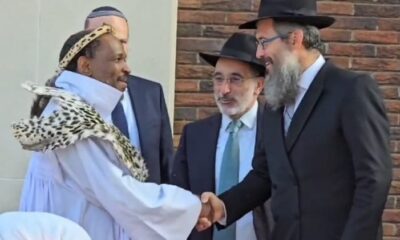
Banner

Einstein missives in archives praise SA Zionism
Renowned German-born physicist Albert Einstein, arguably the scientific world’s most famous Jew, wrote two messages to the South African Jewish community expressing praise and encouragement for its commitment to building the state of Israel.
He wrote of being proud of the South African community as being “always ready to sacrifice”, and said he believed they “deserve great praise for having redeemed this stretch of land for the new creation”.
Back in 1933, Einstein, already a celebrity scientist, left his native Germany for the United States in the wake of Adolf Hitler’s rise to power and surging antisemitism. It was a tumultuous time for him.
A secular Jew who was an outspoken humanitarian and pacifist, he was also known to be sceptical of the Zionist movement, harbouring disdain for any form of nationalism. He would, however, over time and with the rise in antisemitism, help raise funds for Zionist causes even though he was conflicted on the topic of a Jewish nation.
The famous scientist has been on cinema screens lately in the movie Oppenheimer, a dramatisation of the life story of J. Robert Oppenheimer, the physicist who had a large hand in the development of the atomic bomb, thus helping to end World War II.
According to historical accounts, seeing how antisemitism was affecting Jews worldwide, Einstein understood the growing need among Jews for a homeland following years of persecution and discrimination, even though he himself had reservations about it.
He became involved in many fundraising initiatives, especially ones in favour of academia, notably for the creation of The Hebrew University of Jerusalem.
In the months before leaving his native Germany, he wrote to the South African Jewish community to inspire it to continue efforts to raise money for the Jewish National Fund. A few years later, he wrote to the then chairperson of the South African Zionist Federation, Bernard Gering, wishing the organisation “luck in your drive”.
Benji Shulman, the director of public policy at the South African Zionist Federation (SAZF), said the organisation discovered two missives from Einstein while exploring the history of the SAZF in anticipation of its 50th national conference, which celebrates 125 years as the oldest national organisation in the Jewish community.
“The telegrams were found in the Jewish Telegraphic Agency (JTA) archive, providing fascinating insight into interaction between the South African community and the rest of the Jewish world at the time. The messages show the importance that Einstein attached to the work that the SAZF was doing to help create the future state of Israel.”
A JTA newspaper article appeared on Tuesday, 3 January 1933, saying, “South African Zionists have received communication from Professor Albert Einstein, now en route to the United States, encouraging them in their efforts to raise funds for the Jewish National Fund.
“I read with great pleasure that after a period of stagnation in Palestine, new settlement activity has been started there again,” Professor Einstein’s communication declared.
“Two of the best factors are participating in this work: the Keren Kayemeth Le Israel, which puts the land at the disposal of the settlers, and the Jewish workmen, whose energy has started to bring about the transformation of the Sharon desert into flourishing orange orchards. The Jews of South Africa of whom we are proud because they are a section of the Jewish people who are always ready to sacrifice, deserve great praise for having redeemed this stretch of land for the new creation. May their constructive power also give a strong impetus to the establishment of the new settlements.”
JNF chairperson Michael Kransdorff said, “South African Jewry were for many years by far the largest contributors to the JNF per capita of any other Jewish community in the world.
“In addition to our contribution to building the citrus industry in the Sharon region, as a community, we can be proud of our role in making the desert bloom and Israel’s success.”
Gavin Morris, the director of the South African Jewish Museum, explained the origins of the pervasive Zionism of the South African Jewish community.
“The decade of the 1930s marked the high-point of antisemitism in South Africa,” he said. “The Afrikaner nationalist movement was deeply influenced by Nazism, and throughout the decade, Nazi-esque movements, such as the Grey Shirts, mushroomed across the country.”
Laws were promulgated to reduce Jewish migration to South Africa. The Quota Act of 1930 limited immigration from those countries from which the majority of Jewish immigrants arrived. This was followed by the Aliens Act in 1937, a thinly veiled attempt to stop the immigration of Jewish refugees from Nazi Germany by emphasising the “good character and likelihood of assimilation” of migrants.
“The Aliens Act effectively ended Jewish migration to South Africa. The animosity faced by the Jews in South Africa at the time only served to strengthen the community’s connection to Zionism, which was already a major feature of our communal identity,” Morris said.
In an undated telegram, written roughly between 1947 to the early 1950s, Einstein wrote to Gering, then chairperson of the SAZF, “Over fifteen years ago, I stated that it is my conviction that Jewish Telegraphic Agency fulfils mission of greatest significance to whole of Jewry. It is only enterprise which reports impartially objectively about all matters of importance to Jewish nation which is distributed throughout world. By its influence upon Jewish and non-Jewish press, this enterprise makes it impossible for Jewish rights to be attecked (sp) anywhere without outside world learning about it. Now I want to reaffirm this statement, and urge you to include this communal agency in South African joint appeal. Good luck in your drive. Albert Einstein”
Said Morris, “1948 was the year of Israel’s independence. It’s also the year when the National Party come to power in South Africa. Many of the Nat’s leadership had been members of the various Nazi-style movements in South Africa, which no-doubt caused some anxiety amongst our community.
Furthermore, Jews were disproportionally represented in the South African Army during World War II, and roughly 800 became Machalniks, fighting in the Israel War of Independence.”
Though not a practicing Jew and a non-Zionist himself, causes such as Hebrew University mattered to Einstein because he felt concerned about growing antisemitism and the limits being placed on access for Jews to universities throughout Europe. Perhaps this is why he felt compelled to write to the South African Jewish community to continue efforts to build the future state of Israel.










